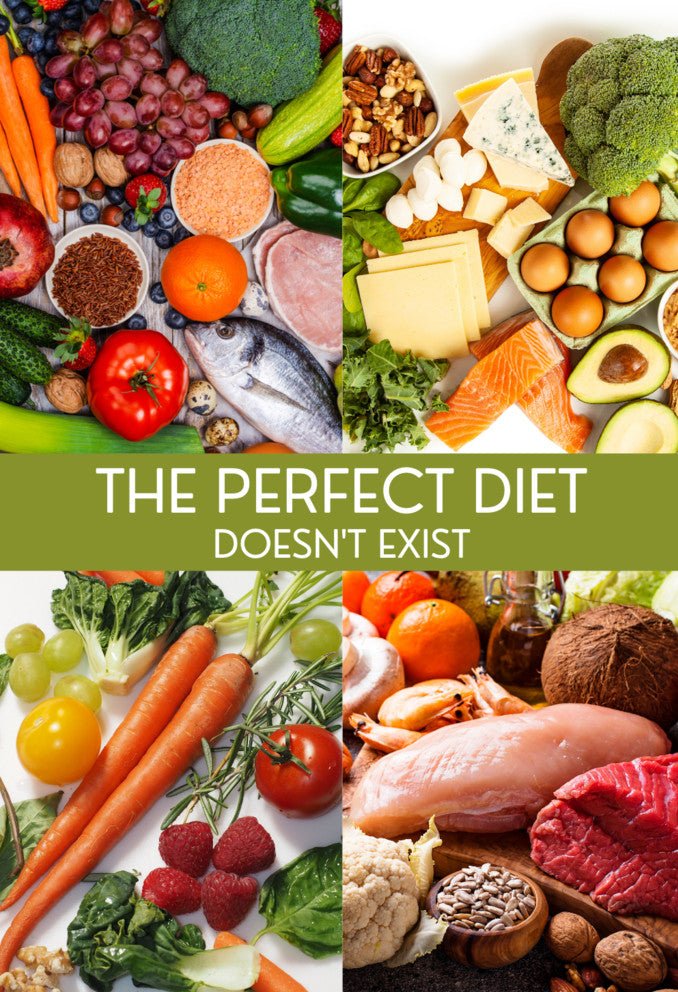
What is Your Perfect Diet?
In the quest for a healthy lifestyle, one of the most frequently asked questions is: "What is the perfect diet?" The reality is, there is no one-size-fits-all answer. Each individual’s dietary needs vary based on their unique life situations, environments, and personal health goals. Despite the abundance of nutritional advice in the media, finding a diet that works perfectly for you is a highly personal journey. So, how do we determine what's best for our bodies without becoming nutrition experts?
The Flaws In One Fits-All Diets
Many popular diets claim to offer the ultimate solution to weight loss, energy boosts, or overall health improvements. However, these diets often overlook the fact that individual needs differ. Factors such as age, gender, physical activity level, health conditions, and even genetic makeup play crucial roles in determining the optimal diet for each person.
For instance, a diet high in carbohydrates might benefit a marathon runner but could be detrimental to someone with insulin resistance. Similarly, a high-protein diet might work wonders for a bodybuilder but could strain the kidneys of someone with pre-existing kidney issues. Therefore, while general nutritional guidelines can provide a foundation, they need to be tailored to fit individual circumstances.
Understanding Your Body's Signals
In a natural environment, our bodies are equipped with an autonomous system that regulates food intake based on our nutritional needs. This system, much like those that control breathing, heart rate, and body temperature, relies on appetite and taste to guide us toward the necessary nutrients. Each nutrient has a distinct flavor that signals its presence in food, helping our bodies recognize what we need.
However, the modern food industry has engineered products to prioritize taste over nutritional value. Highly processed foods are designed to be hyper-palatable, meaning they stimulate our taste buds without providing the necessary nutrients. This confuses our body's natural signals, leading to overeating and poor dietary choices.
The Impact of Modern Food on Our Appetite
Modern food products often contain artificial flavors, added sugars, and unhealthy fats that make them irresistibly tasty. Unfortunately, these foods lack the essential nutrients our bodies require, causing a disconnect between appetite and actual nutritional needs. As a result, our appetite may signal hunger even when we have consumed enough calories, simply because the body is still craving the missing nutrients.
This discrepancy can lead to a cycle of overeating and nutrient deficiency. For example, consuming a bag of chips might satisfy your taste buds but leave your body still in need of vitamins and minerals. Consequently, you might continue to feel hungry, prompting further eating without addressing the root cause of the hunger.
Reconnecting with Your Body's Natural Cues
The key to finding your perfect diet lies in reconnecting with your body's natural hunger and fullness cues. By consistently consuming nutrient-dense, real foods, you can help restore your body's ability to accurately signal its needs. This process involves making mindful food choices and listening to your body's responses.
Here are some steps to help you start this journey:
-
Prioritize Whole Foods: Focus on eating whole, unprocessed foods that are rich in nutrients. Fresh fruits, vegetables, lean proteins, whole grains, nuts, and seeds should form the core of your diet.
-
Reduce Processed Foods: Minimize the intake of highly processed foods, sugary snacks, and fast food. These items are often high in calories but low in essential nutrients.
-
Eat Mindfully: Pay attention to your hunger and fullness cues. Eat slowly, savor each bite, and stop eating when you feel satisfied, not stuffed.
-
Stay Hydrated: Sometimes thirst is mistaken for hunger. Ensure you drink plenty of water throughout the day to stay hydrated.
-
Balance Macronutrients: Include a balance of carbohydrates, proteins, and fats in your meals to ensure a well-rounded intake of essential nutrients.
-
Listen to Your Cravings: Cravings can sometimes indicate specific nutrient deficiencies. For example, a craving for chocolate might signal a need for magnesium. Learn to identify and address these cues with healthier options.
Overcoming Initial Challenges
Reconnecting with your body's natural signals is not an overnight process. Many people feel disconnected from their bodies and find it challenging to understand and trust their hunger cues initially. Here are some tips to overcome these challenges:
-
Be Patient: Understand that this is a gradual process. Your body needs time to adjust to a new way of eating and to start giving you accurate signals.
-
Educate Yourself: Learn about the nutritional content of different foods and how they affect your body. This knowledge can help you make informed choices.
-
Seek Support: Consider working with a nutritionist or dietitian who can provide personalized guidance and support.
-
Stay Consistent: Consistency is key. Stick with your new eating habits even when it's challenging. Over time, your body will adapt, and the signals will become clearer.
Conclusion
Finding your perfect diet is a personal journey that requires patience, mindfulness, and a willingness to listen to your body. While no one can prescribe a one-size-fits-all diet for you, by focusing on whole, nutrient-dense foods and paying attention to your body's natural cues, you can create a diet that is tailored to your unique needs. Remember, this is not a quick fix but a sustainable way of life that empowers you to take charge of your health and well-being. So, start today and embrace the journey of discovering what truly nourishes your body.
start with real food
content source:
the real food blog
